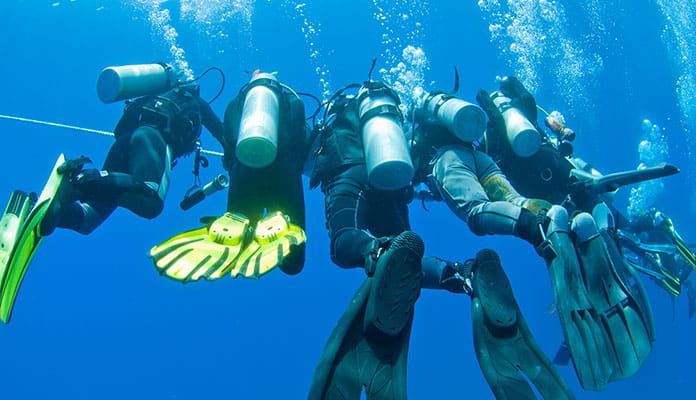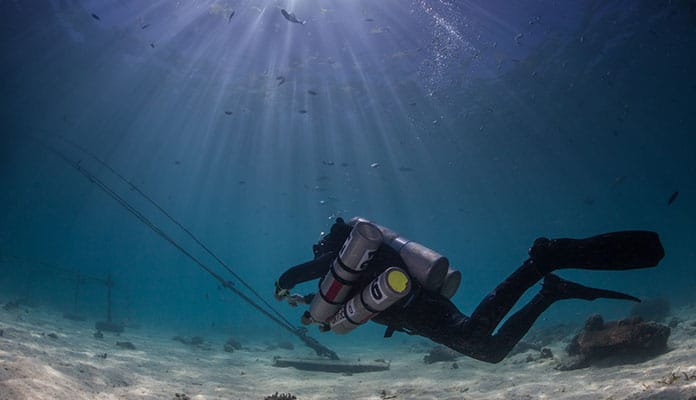
Decompression sickness (DCS) is one of the worst nightmares of any scuba diver, and although the incidence of DCS is quite low, it doesn’t mean that the dangers aren’t real. Any diver, at some point in their diving experience, is bound to experience DCS albeit in less threatening degrees (usually in the form of skin tingling or joint pains). A full-blown DCS ever occurring is quite rare, but it remains to be one of the biggest concerns for many divers. There are several ways to avoid getting ‘the bends’ (as DCS is also sometimes referred to) and we’ve outlined the most common and effective ones below.
1. Never Dive without a Dive Plan
As with any other journey, a trip to the underwater world requires careful planning so never, ever dive without a dive plan. Knowing your dive site, the depths that you want to reach, the water conditions, and other related factors will help make your diving experience much safer and more enjoyable.
When planning a dive, most scuba divers use dive tables, a depth gauge, and a dive watch. However, almost all scuba divers nowadays rely on a dive computer simply because it is much more convenient and easier to use.
A dive computer is a combination of a timer and a submersible pressure gauge (SPG) in one single gadget. It applies all the information it gathers are to a pre-programmed decompression model to track the dissolved nitrogen in your body while diving. It also tells you how much dive time you have left. All in all, a reliable dive computer will provide you with the real-time information you’ll need for a successful dive.
2. Avoid Alcoholic Drinks before Diving
We don’t even have to tell you this, but you should definitely avoid drinking alcoholic beverages before you plunge into the water or even immediately afterward if you want to avoid decompression sickness.
Diving under the influence of alcohol does not come with any legal or financial repercussions as driving or boating under the influence do, but a pre-dive drink, no matter how small, can have negative effects on your body and performance while underwater.
Alcohol is a known diuretic and contributes to dehydration, which in turn can affect your blood circulation and heart rate. Remember, when breathing compressed air underwater your blood will be saturated with nitrogen, and an increased heart rate will cause the said gas to flow throughout your body faster. This increases the chances of nitrogen turning into tiny bubbles instead of being broken down into smaller soluble states that easily and safely escape the bloodstream and body.
Aside from that, the fact that you’re intoxicated will negatively impact your presence of mind and cloud your judgment, both of which you’ll need when an emergency arises while you’re driving.
3. Avoid Drinking Caffeinated Drinks
Just like alcohol, caffeinated drinks like coffee are diuretics and as such will leave you dehydrated, which in turn increases your chances of getting decompression sickness. Most divers would recommend avoiding caffeinated drinks at least twelve hours before your dive. However, others say that it is okay to drink a cup of coffee several hours before diving, as long as you flush yourself with water afterward and stay hydrated throughout the rest of the diving expedition.
4. Ascend Slowly
When scuba diving, your body absorbs nitrogen gas, which then compresses due to water pressure and slowly saturates your body tissues. When you ascend too fast, the nitrogen gas will expand very quickly and your body won’t be able to get rid of it efficiently and safely. When this happens, the nitrogen gas will form tiny bubbles in your body tissues which can lead to decompression sickness.
That said, you need to ascend slowly enough so that your body can release the nitrogen gas safely. This becomes more important as you go for the final ascent because the shallower the water gets, the faster the water pressure surrounding your changes.
Several agencies and institutions have different recommendations as to how slow you should ascend from a dive. However, it seems that most would agree that it should be between nine meters to eighteen meters per minute.
5. Stay Hydrated
 By now you may have already guessed that proper hydration is important if you want to avoid decompression sickness. But to drive home the point, let’s some more about why this is such a crucial factor in avoiding “the bends”.
By now you may have already guessed that proper hydration is important if you want to avoid decompression sickness. But to drive home the point, let’s some more about why this is such a crucial factor in avoiding “the bends”.
Dehydration has been established as one of the contributing factors to decompression sickness. This is because dehydration reduces the volume of blood plasma. When the reduction is too great, it can lead to decreased efficiency of gaseous exchange. This in turn affects off-gassing of nitrogen and increases your risk of developing decompression sickness. Nitrogen is washed out by the lungs after the dive, but this off-gassing process becomes inefficient because of dehydration.
Thus, it is recommended that you drink plenty of water before going for a dive. However, it is better that you drink a glass of water every 15-20 minutes instead of drinking a liter of water right before the dive. Also, eating foods with high water content such as fruits will help keep you hydrated. When you are properly hydrated, your body can better cope with nitrogen saturation and thus reduce your chances of getting decompression sickness.
6. Keep Warm
It is a commonly accepted belief that being cold during a dive can increase your chances of getting decompression sickness. Thus, you must keep warm during and between dives by wearing the appropriate scuba diving suit. When you’re cold, your body holds on to the nitrogen you breathe in longer which then causes DCS.
Aside from that, it can be very uncomfortable diving when you’re cold, and this will affect how much fun you’ll have while driving. It can also affect your performance, making it harder for you to swim back to the boat and climb the ladder as your body burns more fuel to keep you warm.
7. Adhere to Safety Stops
A safety stop is simply a stopping point on the way back to the surface. This is necessary since it allows our bodies to recuperate from nitrogen saturation safely. Safety stops become even more important if you go on deeper and longer dives.
In many cases, your dive computer will indicate when you should make a stop and for how long. However, it may be a better idea to do a slightly longer stop than what the computer indicates just to be on the safe side. Besides, this will give you a few more minutes to enjoy being underwater.
You might also like: Most Common Skin Bends After Scuba Diving Complete Guide
8. Avoid Strenuous Exercises Before and After a Dive
Before you go on a scuba diving adventure, be sure that you are well-rested. A little warm-up exercise is okay, but you should avoid doing any strenuous exercises or activities before you suit up. Don’t try to squeeze in those bench presses and squats in the morning if you’re going diving in the afternoon. Besides, avoid doing heavy exercises after your dive. Have at least a minimum of four hours of rest after diving to reduce your risk of getting decompression sickness. Vigorous exercises (both before and after a dive) can increase your blood circulation levels which can affect oxygen and nitrogen circulation in your body.
9. Do the Deepest Dive First when Doing Multiple Dives
 It is quite normal for some scuba divers to go on multiple dives in one day. Some recreational and holiday divers also do the same to make the most out of their vacation. However, when you’re not careful, you can get decompression sickness.
It is quite normal for some scuba divers to go on multiple dives in one day. Some recreational and holiday divers also do the same to make the most out of their vacation. However, when you’re not careful, you can get decompression sickness.
When it comes to multiple dives, experts recommend that you do your deepest dive first and save the shallower depths for later. Some will even recommend that your last dives shouldn’t be deeper than twelve meters utmost just to be safe. If you’re not feeling well after your previous dive, you may want to sit out the remaining dives for the day and rest instead.
10. Don’t Fly Immediately After Diving
Some people try to squeeze in a few more dives just before they fly back home and to their work. After all, who would want to waste their vacation sitting on the beach when you can be out there in the water watching manta rays and barracudas swimming about? Besides, this is another opportunity to take some underwater selfies because, you know, you can never have too many selfies.
However, if you want to avoid getting decompression sickness, you may want to skip diving and spend your last day on a relaxing swim or sunbathing.
Experts recommend a gap of 12 to 24 hours between your last dive and your flight. This is because when we fly, the remaining nitrogen bubbles in our bodies can expand quickly due to the decreasing atmospheric pressure and could cause the onset of decompression sickness.
Globo Surf Overview
That said, there is no amount of planning and preparation that can guarantee 100% that a diver will not get decompression sickness when diving. However, following the tips mentioned above, listening to your body, and diving conservatively will help reduce your chances of getting DCS. If you’re feeling under the weather or something isn’t right, dive off. Remember, diving is supposed to be fun and enjoyable. Unless you’re diving for competition or trying to set a new world record, don’t push the envelope.

